- Home
- »
- Medical Devices
- »
-
Nebulizer Market Size, Share, Growth, Industry Report, 2030GVR Report cover
![Nebulizer Market Size, Share & Trends Report]()
Nebulizer Market (2025 - 2030) Size, Share & Trends Analysis Report By Type (Jet, Mesh, Ultrasonic), By Application (COPD, Asthma, Cystic Fibrosis), By End-use (Hospitals & Clinics, Emergency Centers, Home Healthcare), By Region, And Segment Forecasts
- Report ID: GVR-2-68038-069-9
- Number of Report Pages: 120
- Format: PDF
- Historical Range: 2018 - 2024
- Forecast Period: 2025 - 2030
- Industry: Healthcare
- Report Summary
- Table of Contents
- Segmentation
- Methodology
- Download FREE Sample
-
Download Sample Report
Nebulizer Market Summary
The global nebulizers market size was estimated at USD 1,224.1 million in 2024 and is projected to reach USD 1,765.1 million by 2030, growing at a CAGR of 6.4% from 2025 to 2030. The rising prevalence of chronic respiratory diseases, increasing demand for home healthcare devices, and growing geriatric population are factors contributing to market growth.
Key Market Trends & Insights
- In terms of region, North America was the largest revenue generating market in 2024.
- Country-wise, Singapore is expected to register the highest CAGR from 2025 to 2030.
- In terms of segment, jet accounted for a revenue of USD 837.4 million in 2024.
- Mesh is the most lucrative type segment registering the fastest growth during the forecast period.
Market Size & Forecast
- 2024 Market Size: USD 1,224.1 Million
- 2030 Projected Market Size: USD 1,765.1 Million
- CAGR (2025-2030): 6.4%
- North America: Largest market in 2024
According to the Centers for Disease Control and Prevention (CDC), chronic obstructive pulmonary disease (COPD) is the fourth leading cause of death in the U.S. Moreover, the rising consumption of alcohol, tobacco, and air pollution are some of the other factors driving the market growth. For instance, According to the American Lung Association’s June 2023 “State of the Air” report, the U.S. experienced its worst air quality due to particle pollution in the past 25 years between 2020 and 2022, leads to the rising respiratory conditions.
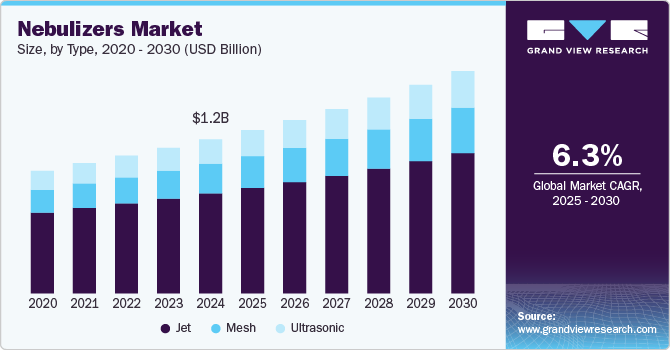
According to the Centers for Disease Control and Prevention (CDC) September 2024 estimates, smoking and second-hand smoke exposure causes around half a million deaths in the U.S. every year. The increasing number of smokers, along with rising environmental pollution are anticipated to increase the demand for nebulizers. In addition, according to the WHO, 3.23 million deaths were caused globally in 2019 due to COPD. Initiatives such as the “Global Alliance against Chronic Respiratory Diseases” are likely to improve diagnosis and treatment rates of respiratory disorders, fostering the market for nebulizers.
The shift towards home healthcare and self-administered treatments has increased the adoption of portable and smart nebulizers, offering convenience and real-time monitoring through IoT and AI integration. Companies such as Sensosan BCorp, offering AI based smart nebulizer. Moreover, Other technological advancements, such as mesh nebulizers that provide efficient drug delivery with reduced noise and faster treatment times, are further propelling market growth. For instance, in May 2024, Medline launched the Hudson RCI TurboMist small-volume nebulizer, developed to deliver medication treatments in as little as three minutes for homecare and hospital settings. According to the company, the TurboMist nebulizer administers 2.5 times more medication per minute than standard nebulizers, significantly reducing treatment time.
In addition, companies aim to address the low awareness of nebulization in acute disease management, further fuelling market growth. Several organizations are launching campaigns to raise awareness of alternative treatments for respiratory disorders. For instance, in its integrated report 2022, OMRON Corporation announced to launch Experience Centers with customer support in major cities in India to provide consumers with hands-on experience with OMRON products and raise consumer awareness about the effectiveness of nebulizers.
Furthermore, the COVID-19 outbreak has affected millions of people around the world. The pandemic has compelled the healthcare industry to take emergency actions, with a race to develop therapeutic and preventive interventions. Asthma or COPD patients, who were aware of the risk of airborne transmission of COVID-19, were hesitant about the use of inhaled medications, which are considered a potential source of viral transmission and immunosuppression. However, medical practitioners advised all such patients to continue using their prescribed inhaled medications, including nebulizers. Nebulized albuterol was recommended in some parts of the U.S. as an alternative to albuterol rescue inhalers when pharmacies faced a shortage of albuterol inhalers.
The Russia-Ukraine conflict hindered the possibility of a COVID-19 pandemic-related economic rebound globally, at least in the short term. Economic restrictions on several countries, a rise in commodity costs, and supply chain disruptions due to the conflict between these two nations have all had an impact on global markets.
In addition, many pharmaceutical corporations are focusing on developing effective treatments to treat the COVID- 19 viruses, which will be primarily administered via a nebulizer. For instance, In May 2021, Inspira Pharmaceuticals and Vectura declared a collaboration to develop a potential inhalation-based COVID-19 therapy. Under this contract, Vectura will test IPX formulation delivery to lungs through its FOX vibrating mesh nebulizer.
The market for nebulizers and respiratory devices is relatively mature, with jets dominating the market due to their low cost. Hence, other nebulization devices are expected to experience high competition. Furthermore, it is a challenge for new technology or devices to gain momentum in mature markets, particularly with the complexities of different reimbursement and national regulatory systems that need to be followed for both drugs and devices. Mesh nebulizers are more expensive than jet nebulizers because of the increased number of tolerances, components, critical parts, and assemblies related to both mesh and electronic control circuits.
Market Concentration & Characteristics
The nebulizers market experiences a moderate to high degree of innovation driven by technological advancements. The introduction of smart AI based nebulizers equipped with connectivity features allows for remote monitoring and data collection, further driving market growth by enabling healthcare providers to track patient adherence and outcomes effectively.
The industry is experiencing a moderate level of merger and acquisition activities undertaken by several key players to gain a competitive advantage in the industry, enhance technological capabilities, and consolidate in a rapidly growing market. For instance, in October 2022, AeroRx Therapeutics collaborated with HCmed Innovations to discover a new therapeutic combination of different classes of medications (bronchodilators) that helps in opening the airways to ease breathing to treat the patients with COPD.
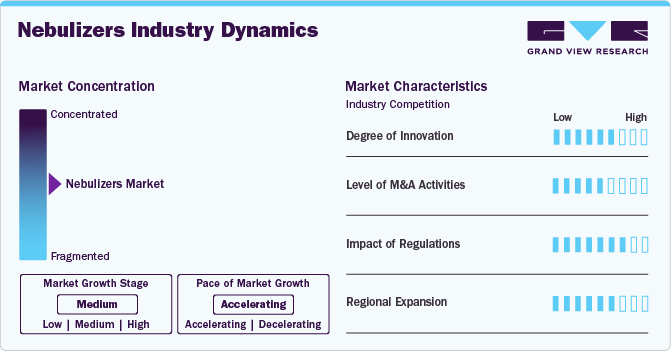
Health authorities such as the U.S. Food and Drug Administration (FDA) and the European Medicines Agency (EMA) govern the regulatory landscape for jet nebulizers. These organizations set stringent guidelines to ensure that nebulizers are safe and effective for patient use. The FDA classifies nebulizers as Class II medical devices requiring premarket notification 510(k).
The industry's regional expansion is moderate, driven by an increasing demand for pneumatic nebulizers in the emerging nations. These nebulizers are traditional, cost-effective, and proven efficient, making them a preferred choice in developing countries.
Type Insights
Jet nebulizers segment held the largest revenue share of 64.82% in 2024, owing to the low cost of the devices. Besides, the ease of handling nebulizers and efficient design for drug delivery has made jet nebulizers the prime segment over the years. Jet nebulizers are effective in delivering formulations that cannot be delivered with dry powder inhalers and pressurized metered-dose inhalers. In addition, nebulizers are available in various designs including jet nebulizers along with corrugated tubes, collection bags, breath-enhanced, and breath-actuated jet nebulizers, and others.
Mesh nebulizers segment is expected to witness lucrative market growth over the forecast period due to the technologically advanced compact size devices and minimized drug loss. The market for mesh nebulizers is expected to grow further, majorly due to increased patient acceptance, quick treatment, portability, and convenience. Furthermore, increasing commercial acceptance of mesh nebulizers due to accurate drug delivery to the lung and lower residual volumes also aid in market penetration. Some of the products offered by the key players in the market are Omron Corporation’s MicroAIR U100 (compact, travel-ready, with mesh technology), Philips Healthcare’s Aeroneb Go (Portable nebulizer based on Aerogen’s vibration mesh technology for patients requiring respiratory aerosol therapy.
Application Insights
Chronic obstructive pulmonary disorder (COPD) segment accounted for the largest market share in 2024, owing to the high global prevalence of COPD, recent technological advancements have made nebulizers more portable and user-friendly. In addition, a wide range of medications, including long-acting beta2-agonists (LABAs), long-acting muscarinic receptor antagonists, steroids, mucolytics, and antibiotics, are now available in nebulized formulations. This expanded availability allows COPD patients to use nebulizers beyond acute healthcare settings, driving segment growth. Companies are actively investing in advanced technologies to enhance disease management. For example, in November 2021, Wellinks secured USD 25 million in funding to develop its virtual platform for COPD treatment. Such innovations are expected to accelerate market expansion.
Asthma segment is expected to witness lucrative growth over the forecast period. Asthma is a non-communicable disease affecting children and adults and a common chronic disorder among children. Asthma has emerged as one of the most prevalent respiratory conditions worldwide due to the increasing pollution. For instance, according to CDC, approximately 6 million children aged 0-17 in the U.S. are diagnosed with asthma. Nebulizers are frequently prescribed to younger children who may find it challenging to use inhalers effectively. Moreover, during acute asthma attacks, nebulizers play a crucial role in providing prompt relief by delivering short-acting bronchodilators directly to the airways. Thus, the rising demand is expected to contribute to market growth.
End-use Insights
Hospitals segment accounted for the largest revenue share of 67.25% in 2024, owing to the favorable reimbursement policies and significant patient footfall. Hospitals are an integral part of the healthcare industry and are the major source of revenue for the industry. Multiple companies are investing substantial efforts in leveraging their marketing strategies to endorse their products/services among the hospitals. For instance, in December 2021, Cipla Limited launched an initiative to enhance access to nebulization therapy for acute asthma management in primary healthcare centers in rural India. Under this initiative, the company aimed to donate 5000 nebulizers to primary healthcare centers in India. Thus, such projects are expected to boost segment growth.
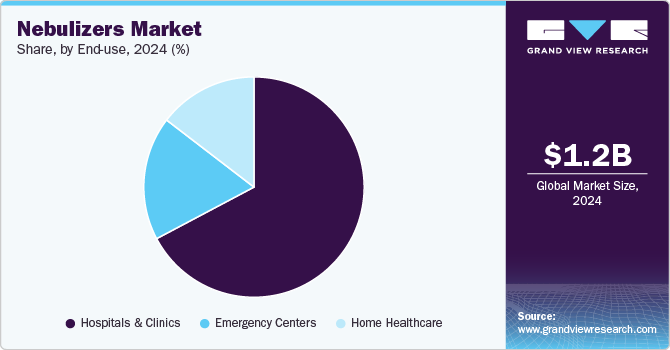
Home healthcare segment is expected to grow at the fastest CAGR over the forecast period. Home healthcare is a cost-effective alternative to expensive hospital stays. The easy availability of compact nebulizers ideal for home use and technological innovations in nebulizers to reduce sound and improve functionality are increasing their adoption in home healthcare.
Regional Insights
North America nebulizers market held the largest revenue share of 34.06% in 2024. The increasing prevalence of respiratory diseases demands nebulizers as a part of the treatment regime. The deteriorating air quality, caused by various factors such as industrial emissions, vehicle exhaust, and wildfires, has led to an increase in respiratory issues among the population. Respiratory diseases such as asthma, Chronic Obstructive Pulmonary Disease (COPD), and bronchitis have become more prevalent, thereby contributing to market growth.
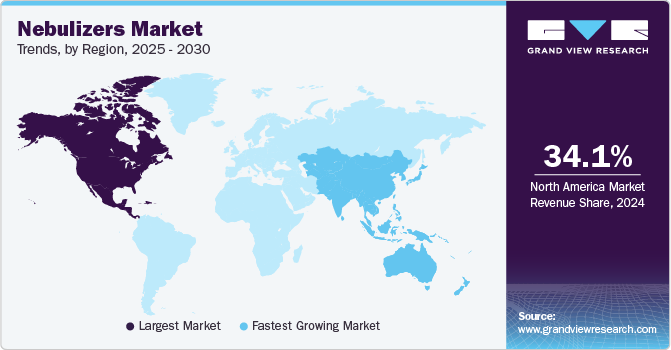
U.S. Nebulizers Market Trends
Nebulizers market in U.S. held the largest revenue share in 2024 due to the rising prevalence of chronic diseases and the increasing prevalence of respiratory diseases such as asthma and COPD, increased awareness about respiratory conditions, and advancements in nebulizer technology. For instance, according to the Asthma and Allergy Foundation of America, around 28 million people in the country are living with asthma. In addition, key companies in the U.S. are taking proactive initiatives and collaborating with the government to enhance respiratory health and promote the use of nebulizers. These efforts focus on improving access to nebulizer therapy and ensuring better respiratory care. For instance, in March 2021, OMRON Healthcare, a global provider of respiratory health technologies, collaborated with the AAFA, the prominent patient organization for individuals with asthma and allergies.
Europe Nebulizers Market Trends
Nebulizers market in Europe observed a lucrative growth in 2024. The increasing prevalence of respiratory diseases is a significant factor contributing to market growth. For instance, according to the data published by Eurostat, respiratory disorders accounted for 6.7% of total deaths in the region in 2020. Moreover, increasing life expectancy and rising geriatric population are propelling the growth of the home care segment in Europe, thereby fostering market growth.
Nebulizers market in UK is expected to grow over the forecast period. This growth can be attributed to the growing prevalence of respiratory diseases, advancements in nebulizer technology, government healthcare policies, and the overall demand for effective respiratory treatments. Companies in the market compete to provide innovative nebulizer devices, improved medication delivery systems, and enhanced portability & convenience.
Nebulizers market in Germany held the largest market share in 2024 in the European market. The presence of key market players, increasing spending on home care services, a well-established healthcare infrastructure, and a rise in the prevalence of respiratory disorders are among the key factors fueling market growth in this country.
Asia Pacific Nebulizers Market Trends
Nebulizers market in Asia Pacific is anticipated to grow at the fastest CAGR from 2025 to 2030. Many countries in the Asia Pacific region have high population densities, leading to overcrowding in urban areas. Countries such as China and India have witnessed rapid industrialization, leading to increased emissions of particulate matter, sulfur dioxide, and nitrogen oxides. These pollutants contribute to respiratory diseases when inhaled by the population. Moreover, these factors, combined with population density, limited access to healthcare, and socioeconomic factors, contribute to the higher rates of respiratory diseases in low and middle-income countries in the Asia Pacific, thereby increasing the demand for respiratory devices in the region.
Nebulizers market in Japan is expected to grow significantly over the forecast period, owing to the availability of abundant skilled labor in the healthcare sector, growing geriatric population, and supportive government policies. Moreover, leading market players are proactively implementing strategic initiatives aimed at expanding their product portfolios and enhancing their customer base, leading to significant market growth.
Nebulizers market in China held the largest revenue share in 2024 due to the increasing air pollution and growing geriatric population. Air pollution has emerged as a significant concern in China, primarily driven by rapid urbanization and the conversion of rural & agricultural land into non-agricultural and urban areas. For instance, in 2019, around 1.42 million people lost their lives due to excess pollution caused by the high concentration of fine particulate matter (PM2.5). Such factors contribute to the increased use of nebulizers, fueling market growth.
Latin America Nebulizers Market Trends
Latin America nebulizers market is anticipated to grow at a significant CAGR over the forecast period. This can be attributed to the rising prevalence of respiratory diseases and the increasing healthcare spending. Moreover, the increasing investments by market players in the region, proximity to North America, and free-trade agreements with major countries such as the U.S., Canada, Japan, & several European countries are among the factors anticipated to boost the Latin America market during the forecast period.
Middle East & Africa Nebulizers Market Trends
Middle East and Africa nebulizers market is expected to grow at a significant CAGR over the forecast period. This can be attributed to technological advancements, increasing healthcare expenditures, and growing prevalence of respiratory diseases.
Key Nebulizer Company Insights
The nebulizer market is a mature market with major players such as Omron, Koninklijke Philips, and PARI. However, the introduction of technologically advanced mesh nebulizers has created many opportunities for the companies such as Vectura Group, PARI Pharma, and others. Many pharmaceutical companies are also using mesh nebulizers for drug development. For instance, as per the analysis of the U.S. and Europe clinical trial databases, mesh nebulizers are preferred for clinical trials sponsored by pharmaceutical companies over jet nebulizers.
To differentiate their products from the other market players, companies are adopting strategies such as new product development, acquisitions, and collaboration with other players or research institutes. For instance, in March 2021, PARI Pharma GmbH, a business that specializes in cutting-edge aerosol delivery systems based on eFlow Technology declared the LAMIRA Nebulizer System authorization in Japan. The LAMIRA Nebulizer System is the only device designed to deliver ARIKAYCE since it is specifically suited for it.
Key Nebulizer Companies:
The following are the leading companies in the nebulizer market. These companies collectively hold the largest market share and dictate industry trends.
- Omron Corporation
- GE Healthcare
- Koninklijke Philips N.V.
- Vectura Group Plc.
- PARI Respiratory Equipment, Inc.
- Aerogen
- DeVilbiss Healthcare LLC
- Beurer GmBH
- Microlife Corporation
- GF Health Products, Inc.,
- Rossmax International Ltd
- BESCO MEDICAL LIMITED
- Bremed Ltd.
Recent Developments
-
In October 2024, Liquidia Corporation collaborated with Pharmosa Biopharm to obtain a license to use Pharmosa’s next-generation smart technology nebulizers. This collaboration helped Liquidia expand its market beyond the U.S. to Europe, Japan, and other countries.
-
In March 2021, PARI Pharma GmbH received authorization for the LAMIRA nebulizer system—intended for the delivery of Insmed’s drug product ARIKAYCE—in Japan.
-
In July 2020, OMRON Corporation launched a cost-effective, all-age-group compatible nebulizer, OMRON NE C106.
-
In July 2018, OMRON Healthcare acquired 3A Health Care srl, which offers specialized aerosol therapy devices and surgical aspirators. This acquisition helped OMRON to leverage its product portfolio.
Nebulizers Market Report Scope
Report Attribute
Details
Market size value in 2025
USD 1.30 billion
Revenue forecast in 2030
USD 1.77 billion
Growth rate
CAGR of 6.35% from 2025 to 2030
Actual data
2018 - 2024
Forecast period
2025 - 2030
Quantitative units
Revenue in USD million/billion, and CAGR from 2025 to 2030
Report coverage
Revenue forecast, company ranking, competitive landscape, growth factors, and trends
Segments covered
Type, application, end-use, region
Regional scope
North America; Europe; Asia Pacific; Latin America; MEA
Country scope
U.S.; Canada; Mexico; Germany; UK; France; Italy; Spain; Denmark; Sweden; Norway; China; Japan; India; South Korea; Australia; Thailand; Brazil; Argentina; South Africa; Saudi Arabia; UAE; Kuwait
Key companies profiled
Omron Corporation; GE Healthcare; Koninklijke Philips N.V.; Vectura Group Plc.; PARI Respiratory Equipment, Inc.; Aerogen; DeVilbiss Healthcare LLC; Beurer GmBH; Microlife Corporation; GF Health Products, Inc.; Rossmax International Ltd; BESCO MEDICAL LIMITED; Bremed Ltd.
Customization scope
Free report customization (equivalent to 8 analysts working days) with purchase. Addition or alteration to country, regional & segment scope.
Pricing and purchase options
Avail customized purchase options to meet your exact research needs. Explore purchase options
Global Nebulizer Market Report Segmentation
This report forecasts revenue growth at global, regional, and country levels and provides an analysis of the latest industry trends in each of the sub-segments from 2018 to 2030. For this study, Grand View Research has segmented the global nebulizers market report based on type, application, end-use, and region:
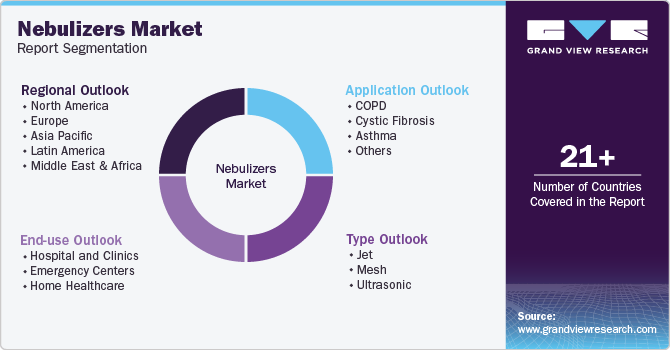
-
Type Outlook (Revenue, USD Million, 2018 - 2030)
-
Jet
-
Mesh
-
Active
-
Passive
-
-
Ultrasonic
-
-
Application Outlook (Revenue, USD Million, 2018 - 2030)
-
COPD
-
Cystic Fibrosis
-
Asthma
-
Others
-
-
End-use Outlook (Revenue, USD Million, 2018 - 2030)
-
Hospital and Clinics
-
Emergency Centers
-
Home Healthcare
-
-
Regional Outlook (Revenue, USD Million, 2018 - 2030)
-
North America
-
U.S.
-
Canada
-
Mexico
-
-
Europe
-
Germany
-
UK
-
France
-
Italy
-
Spain
-
Denmark
-
Sweden
-
Norway
-
-
Asia Pacific
-
China
-
Japan
-
India
-
South Korea
-
Australia
-
Thailand
-
-
Latin America
-
Brazil
-
Argentina
-
-
MEA
-
South Africa
-
Saudi Arabia
-
UAE
-
Kuwait
-
-
Frequently Asked Questions About This Report
b. The global nebulizer market size was estimated at USD 1.22 billion in 2024 and is expected to reach USD 1.30 billion in 2025.
b. The global nebulizer market is expected to grow at a compound annual growth rate of 6.35% from 2025 to 2030 to reach USD 1.77 billion by 2030.
b. North America dominated the market with a revenue share of 34.06% share of the nebulizer market in 2024 owing to growing respiratory disorders and efforts by the government such as favorable reimbursement scenarios, a rise in customer awareness, and a well-established healthcare infrastructure.
b. Some key players operating in the nebulizer market include Omron Corporation, GE Healthcare, Koninklijke Philips N.V., Vectura Group Plc., PARI Respiratory Equipment, Inc., Aerogen, DeVilbiss Healthcare LLC, Beurer GmBH, Microlife Corporation, GF Health Products, Inc., Rossmax International Ltd, BESCO MEDICAL LIMITED, and Bremed Ltd.
b. Key factors that are driving the nebulizer market growth include the rising incidence rate of chronic respiratory diseases, increasing demand for home healthcare devices, and rising geriatric population.
Share this report with your colleague or friend.
Need a Tailored Report?
Customize this report to your needs — add regions, segments, or data points, with 20% free customization.

ISO 9001:2015 & 27001:2022 Certified
We are GDPR and CCPA compliant! Your transaction & personal information is safe and secure. For more details, please read our privacy policy.
Trusted market insights - try a free sample
See how our reports are structured and why industry leaders rely on Grand View Research. Get a free sample or ask us to tailor this report to your needs.










